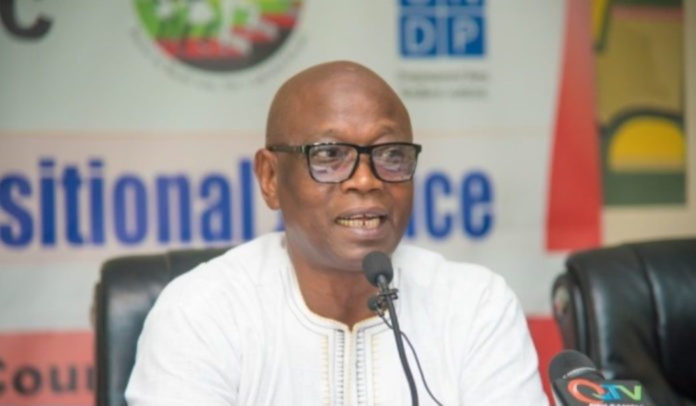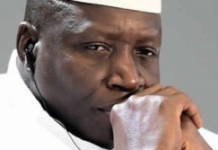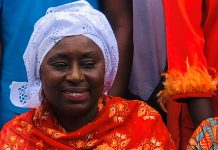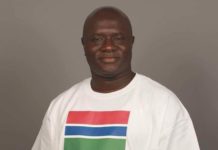By Yankuba Jallow
Dr. Baba Galleh Jallow, Executive Secretary of the Truth, Reconciliation and Reparations Commission (TRRC), said 188 witnesses have testified before the Commission in 2019.
Dr. Jallow said among the 188 witnesses, 51 were women, 35 were alleged perpetrators and adversely mentioned persons, and 23 were Gambian Diaspora witnesses who testified via video link. Jallow said the 11th session of hearings and the first for 2020, is scheduled to begin on Monday January 20th and will focus on the former president’s alternative treatment program during which the rights of several patients were violated.
He said over the past twelve months, the TRRC has covered a number of important themes on its work plan which include circumstances surrounding the July 22nd 1994 coup and its immediate aftermath; the November 11th 1994 incident; the January 1995 arrest and detention of former AFPRC members Sanna Sabally and Sadibou Haidara; the June 1995 murder of former finance Minister Ousman Koro Ceesay; the 1996 incident involving supporters of the opposition United Democratic Party and security forces at Denton Bridge; the crackdown on the media and violations of human rights against journalists; the activities of the Junglers and some cases of sexual and gender-based violence against women; the April 2000 student demonstrations; arbitrary arrests, detentions and tortures, and the 2009 presidential witch-hunts in which hundreds of people were forced to drink dangerous concoctions.
“Over the coming year, the Commission will hold hearings on the former president’s fake alternative treatment program, enforced disappearances, the case of 44 Ghanaians and other West African migrants who were killed in the Gambia in July 2005 and the April 2016 incidents involving the former NIA resulting in the death in custody of UDP member Solo Sandeng.
The Commission will also hold institutional hearings on the National Intelligence Agency; the Judiciary; the National Drug Law Enforcement Agency (NDLEA) and the prisons. Other cases of human rights violations including some from past themes, will continue to be investigated and witnesses will be heard as necessary,” Jallow said. He said the evidence that has come out of witness testimonies since 7th January 2019, shows that there was widespread human rights violations in the Gambia under the Jammeh regime.
“From both victims and perpetrators, we have learnt of arbitrary arrests, detentions, horrible prison conditions, tortures, killings, sexual abuses and the incomprehensible practice of accusing innocent people of witch-craft and subjecting them to cruel, inhumane and degrading treatment by forcing them to drink health-destroying concoctions; and subjecting them and their families to a life of stigma and public ridicule. The extent of the human rights violations that occurred in this country defy comprehension and we are confident that this has cemented a determination in Gambians to never again allow their rights and dignities to be trampled upon with impunity by the state.
‘‘In this regard, we are glad to note that our ‘Never Again’ campaign has registered noticeable impact on the Gambia’s national consciousness, however modest,” he said.
Jallow said from the very start, the TRRC has operated on the principle that the ultimate rationale for the establishment of all truth commissions is to prevent a recurrence of human rights violations that happened in the past; that the TRRC also operated on the conviction based on verifiable evidence, that truth commission reports and recommendations alone do not necessarily prevent a recurrence.
“For that reason, the TRRC adopted an operational strategy that allows the commission to investigate the past and create an impartial historical record of human rights violations with a view to making recommendations to the Government at the end of its mandate, while at the same time conducting outreach activities that address those causes and enablers of dictatorship and political impunity that lies outside of any institutional, administrative and legal reforms that the Commission may recommend in its final report,” he said.
He said while the Commission’s public hearings were ongoing, various units of the TRRC secretariat were engaged in outreach activities across the country that sought to involve everyone in a national conversation on the causes of dictatorship and how best to prevent a recurrence through proper understanding of the proper relationship between state and society; that in line with their dual-process approach to the work of truth commissions with hearings on one hand and outreach activities on the other, the TRRC’s units have conducted close to one hundred town hall meetings, village dialogues, women’s and men’s listening circles, and School visits across the country, since October 2018.
“In essence, the TRRC has consistently worked as a Janus-faced commission which whilst investigating and recording past human rights violations, has its sight firmly set on helping build a Gambia in which citizens are empowered enough to hold their Government responsible and to say no to any signs of dictatorship or human rights violations,” he said.
Jallow said the TRRC is lucky to be one of the very few truth commissions in the world to be given the power to grant reparations to victims.
“Most truth commissions can only recommend reparations; and because truth commission recommendations especially on reparations are generally not famous for being implemented, victims in many countries do not often get reparations long after their truth commission processes end.
The Gambia’s TRRC is proving an exception to that rule. The fact that the TRRC Act grants the Commission powers to grant reparations meant that we could institute an interim reparations program through which a growing number of victims will get access to medical attention as well as employment and educational opportunities, and some livelihood support,” he said.
He said Yusupha Mbye, Oumie Jagne and Abdou Karim Jammeh, three victims of the April 2000 student demonstrations, and Nogoi Njie, a victim of the April 2016 incident, have travelled to Turkey for free medical treatment and are accompanied by two TRRC staff and one volunteer.
“This is the TRRC’s first major breakthrough in facilitating access to overseas medical treatment for victims since the Ministry of Health established a medical board at the Commission’s request back in November 2018. As of December 2019, the medical board has seen 50 victims who were referred to them by the TRRC.
Meanwhile, the TRRC’s Victim Support Unit continues to offer medical assistance and psychosocial support to several victims in the Gambia. So far, the Victim Support Unit has registered 941 victims of various kinds of human rights violations. It is anticipated that more victims will benefit from both local and overseas medical treatment in the coming year,” Jallow concludes.





















